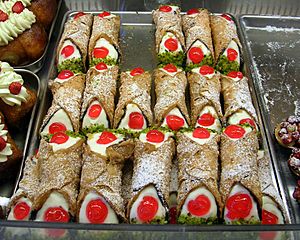Cannoli facts for kids

Cannoli topped with chopped pistachios, candied fruit and chocolate chips sprinkled with confectioner's sugar
|
|
| Type | Pastry |
|---|---|
| Place of origin | Italy |
| Region or state | Sicily |
| Main ingredients | fried pastry dough, ricotta filling |
| Variations | Kannoli (Malta) Kanojët (Albania) |
Cannoli are delicious Italian pastries. They are made of crispy, tube-shaped shells. These shells are fried dough. Inside, they have a sweet, creamy filling. This filling usually contains ricotta cheese. Cannoli are a very popular dessert from Sicily, Italy. They can be different sizes, from about 9 cm (3.5 inches) to 20 cm (8 inches) long. In Italy, people often call them cannoli siciliani, which means 'Sicilian cannoli'.
What's in a Name?
In English, we usually say "cannoli" for one or many. But in Italian, "cannoli" means more than one. If you want to talk about just one, you would say "cannolo". The word "cannolo" means 'little tube'. It comes from the Italian word canna, which means 'cane' or 'tube'.
A Sweet History
Some food experts believe cannoli first appeared a very long time ago. They might have started between 827 and 1091 AD in a place called Caltanissetta, in Sicily. People in royal courts might have created them to impress others.
Another idea is that cannoli came from the areas of Palermo and Messina. Historically, they were a special treat made during the Carnival season. Carnival is a festive time before Lent. Over time, this tasty dessert became popular all year round in Sicily.
There are some similar desserts in the Middle East. For example, "Zaynab's fingers" are pastries filled with nuts. Also, qanawāt are deep-fried dough tubes with sweet fillings. These were popular in ancient Islamic countries. It's possible that cannoli and their name came from the Muslim Emirate of Sicily long ago.
Images for kids
See also
 In Spanish: Cannolo para niños
In Spanish: Cannolo para niños
 | Precious Adams |
 | Lauren Anderson |
 | Janet Collins |



